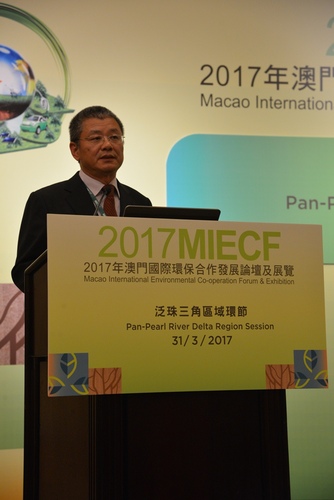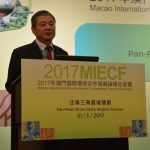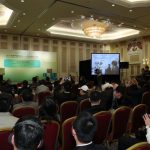 Mr Jiang Xiaoting, President of the Sichuan Province Environmental Science Association, delivered a keynote speech at the “PPRD Session”.
Mr Jiang Xiaoting, President of the Sichuan Province Environmental Science Association, delivered a keynote speech at the “PPRD Session”.
The “Pan-Pearl River Delta Region (PPRD) Session” was held today (31 March) during the second day of the “Green Forum” at the 2017 Macao International Environmental Co-operation Forum and Exhibition (2017MIECF). Public figures of the environmental sector from the PPRD Region were invited as speakers, while a Round Table Discussion also took place during the event. Mr Jiang Xiaoting, President of the Sichuan Province Environmental Science Association, shared insights on environmental protection and river basin management gained from recent visit to Brazil and Portugal organised by the Macao SAR Government, for a delegation of the “9+2” group of the PPRD Region. He stated China could learn from the rich experience of both countries in this area, in an effort to promote the development of environmental protection in China.
The “PPRD Session” was hosted on the afternoon of 31 March. Representatives from the PPRD provinces and regions attended the event. Mr Jiang delivered a keynote address at the Session. As a member of a March business delegation organised by the Macao SAR Government and made up of representatives of the “9+2” group of the PPRD Region, Mr Jiang paid an eight-day visit to Brazil and Portugal. By taking advantage of Macao’s role as a trade and economic co-operation service platform between China and Portuguese-speaking Countries, the trip aimed to facilitate environmental business exchange between China’s PPRD provinces and regions, Brazil and Portugal. The delegation focused on exchange of experiences regarding environmental protection, river basin management and other environmental issues.
Mr Jiang said the ecological protection of the Amazon Basin in Brazil started with legislation, while international co-operation had also been strengthened. The Amazon Cooperation Treaty was signed by eight countries in South America, with all the signatory parties joining hands and taking action to facilitate co-ordinated development within the Amazon region. In turn, Brazil strengthened its legal system with regard to environmental protection, formulating and implementing specialized laws and regulations. The development and use of water, geological and forestry resources were under strict supervision, while local governments did not have the power to approve any development projects close to the Amazon River, so as to avoid local protectionism and institutional corruption.
- Jiang pointed out the Brazilian government nonetheless allowed development and utilization of biological resources. This provided inspiration to China regarding how to turn ecological advantages into development advantages. The use of local resources in ecotourism in the Amazon region could be a reference point for China, in particular for the country’s poor mountainous regions, where ecotourism could be adapted to local conditions and put into effect. In addition, Brazil’s construction of eco-control systems was an important reference point for other countries.
Regarding lessons learned on the Portugal leg of the trip, Mr Jiang believed that the key to environmental management was to improve the quality of the environment. While reduction of emissions from pollutants was considered a fundamental goal, the main source of China’s polluting emissions was certain types of infrastructure, with sewage discharge control a key to prevention and control of pollution. A stricter licensing system for sewage discharges would make sure enterprises’ discharge emissions should meet required standards, and effectively control the amount of pollutant emissions in regional river basins. Setting up a brand-new environmental management system that was based on a stricter sewage discharge system would be a significant step in developing systems for a new era of environmental protection in China. By taking note of the successful experiences of Portugal and the European Union in general, China could boost development of its environmental protection industry.
The second part of the session was a Round Table Discussion about “Green Innovative Development in the Pan-Pearl River Delta Region”, in which presidents and Secretaries-General of various Environmental Protection Associations of the PPRD Region introduced their latest technological advances and achievements in the environmental field around the theme "technology innovation, management innovation and model innovation", promoting closer co-operation in environmental protection.
View gallery


